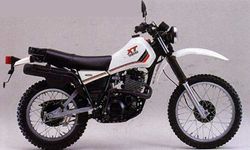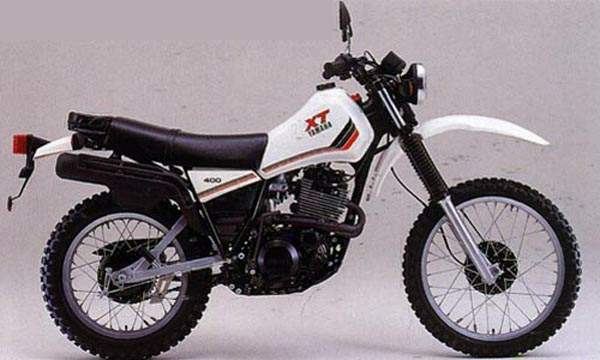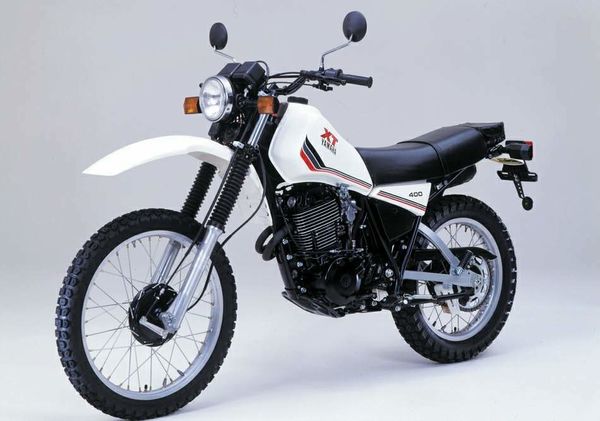Difference between revisions of "Yamaha XT400"
(adding recommended_oil) |
(has images) |
||
| Line 72: | Line 72: | ||
[[Category:Yamaha motorcycles]] | [[Category:Yamaha motorcycles]] | ||
[[Category:1980s motorcycles]] | [[Category:1980s motorcycles]] | ||
Revision as of 03:11, 19 November 2019
 |
|
| 'Yamaha XT400' | |
| Manufacturer | [[Yamaha]] |
|---|---|
| Also called | XT 400 |
| Production | 1981 |
| Class | [[:Category:Enduro motorcycles|Enduro]] [[Category:Enduro motorcycles]] |
| Engine | Air Cooled, Four Stroke, Single Cylinder, SOHC, 4 Valves Per Cylinder |
| Bore / Stroke | 86.4mm x 86.4mm |
| Compression ratio | 8.8:1 |
| Horsepower | 30.98 HP (23.1 KW) @ 7000RPM |
| Torque | 22.87 ft/lbs (31.0 Nm) @ 6000RPM |
| Transmission | Gear box: 5-Speed Final Drive: Chain |
| Suspension | Front: Telescopic Forks Rear: Monocross |
| Brakes | Front: Single Disc Rear: Single Disc |
| Front Tire | 3.00-21 |
| Rear Tire | 4.60-18 |
| Wheelbase | 55.31 inches (1405 mm) |
| Length | 89.02 inches (2261 mm) |
| Width | 33.9 inches (861 mm) |
| Weight | 146.0 kg (wet) |
| Recommended Oil | Yamalube 10w-40 |
| Fuel Capacity | 0.79 Gallon (3.00 Liters) |
| Manuals | Service Manual |
The Yamaha XT 400 was a Air Cooled, Four Stroke, Single Cylinder, SOHC, 4 Valves Per Cylinder Enduro motorcycle produced by Yamaha in 1981. Max torque was 22.87 ft/lbs (31.0 Nm) @ 6000 RPM. Claimed horsepower was 30.98 HP (23.1 KW) @ 7000 RPM.
Engine
A 86.4mm bore x 86.4mm stroke result in a displacement of just 399.0 cubic centimeters.
Drive
The bike has a 5-Speed transmission. Power was moderated via the Wet multi-plate.
Chassis
It came with a 3.00-21 front tire and a 4.60-18 rear tire. Stopping was achieved via Single Disc in the front and a Single Disc in the rear. The front suspension was a Telescopic Forks while the rear was equipped with a Monocross. The XT 400 was fitted with a 0.79 Gallon (3.00 Liters) fuel tank. The wheelbase was 55.31 inches (1405 mm) long.
1981 - 1995 Yamaha XT 400
This model from 1981, was in fact an XT 500 with a reduced displacement engine and was quickly abandoned to make way for the new XT 400, which is marketed six months after the XT 550. The Yamaha XT 400 and the XT 550 share the Most of their elements, and are not devoid of qualities, carburetor double-body differentiated opening, cylinder head four valves, suspension in evolution compared to the previous models. These two models will nevertheless have a mixed success against the XT 600, which arrives on the market at the end of 1982.

